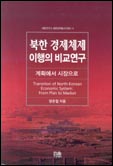North Korea maintained centrally planned economy for more than half century. With economic
inefficiency, it is becoming increasing apparent that the North Korean economic system will
face an eventual breakdown. Within the past several years, North Korea has implemented certain
reforms that have allowed more free markets in the cities and provinces, provided incentive pay
to factory workers, and expanded markets for farmers. Unfortunately, the result so far has been
unsatisfactory, primarily because North Korea’s core policy is basically adverse to economic
reform. Though North Korea can launch similar reforms experienced in China, Eastern European
countries, and other transition countries, the future of North Korean economy is pessimistic.
It is, of course, hard to predict the future of North Korea. But it is possible to extrapolate
its future from the system transition process of the former Soviet Union and East European
nations, which had similar industrial systems to the North’s. It is worth noting that the
system transition in Russia and East European countries was spurred by the combination of two
factors: the collapse of the former Soviet Union as an external factor and structural contradictions
of the socialist economy system as an internal factor. Though changes in Eastern Europe were a historic
and unique event, it is hard to find a universally valid economic policy on the system transition
mainly because of the difficulty in establishing a solid theory and finding sufficient empirical evidences.
Thus, a lot of economic theories have failed to provide a commonly convincing explanation of the economic
transition in North Korea. It is known that every nation has formulated its policy based on its own unique
conditions. One thing is clear, however, that the economic policies of Eastern European countries are
alternative ones aimed at getting rid of inefficiencies of the socialist economic system.
Whatever the transformation path North Korea adopts, the economic burden for rebuilding the North Korean
economy could be attributed to the South Korea: the North Korean economy would suffer a serious setback
as no institutions and structures of market capitalism are expected to function during the transition
period. Major renovations to develop the North Korean economy will include public investment in social
infrastructure, new plants and capital equipment, and welfare payments to the unemployed. However, with
scanty information on the North Korean economy, the cost defies estimation.
In order to cope with a sudden collapse of the North Korean regime and its resultant economic implications,
the South Korean government is preparing an incremental approach to the integration of two dissimilar
economic systems to build a firm internal base for unification. If the daunting task of economic integration
proves to be successful, Korea would emerge as a powerful country with strong economic capabilities supported
by an abundant pool of skilled manpower. In this plot, the North Korean economy jumps on the right track of
successful reconstruction and self-sustaining growth; consequently, income convergence inhibits mass-migration
from the North. To implement the unification plan, the South Korean government is expected to raise the
necessary funds and bear the financial burden of unification.
No : 2005-04
Publishing Company : Hanwool Academy
Date of Publication : 2005
Number Of Pages : 357 Page
Price : 24,000 Won
